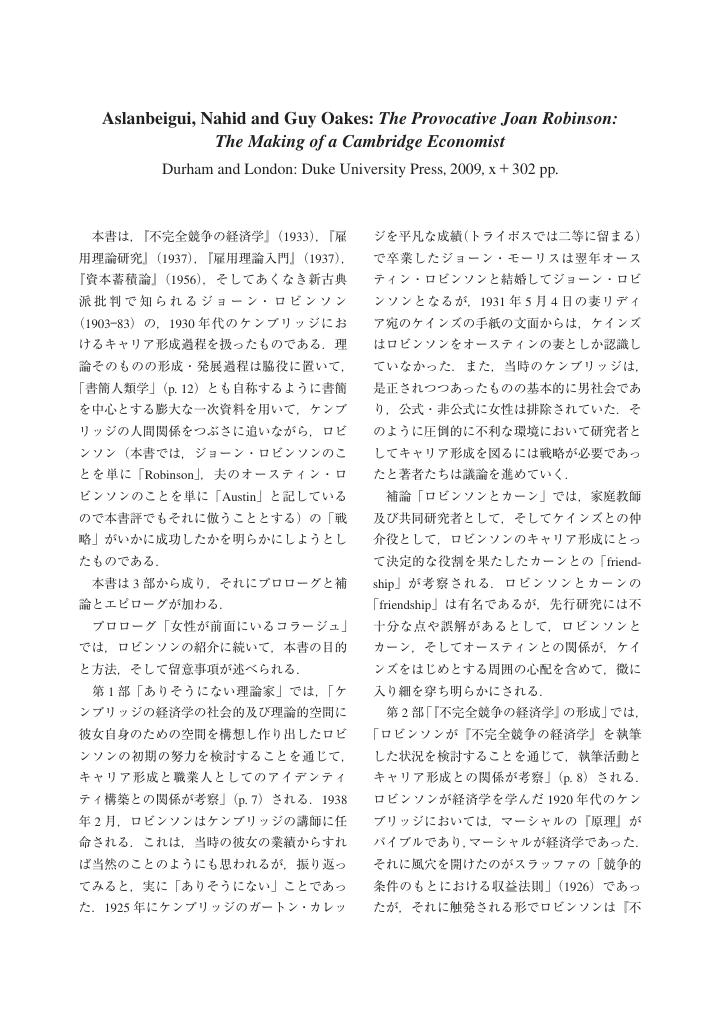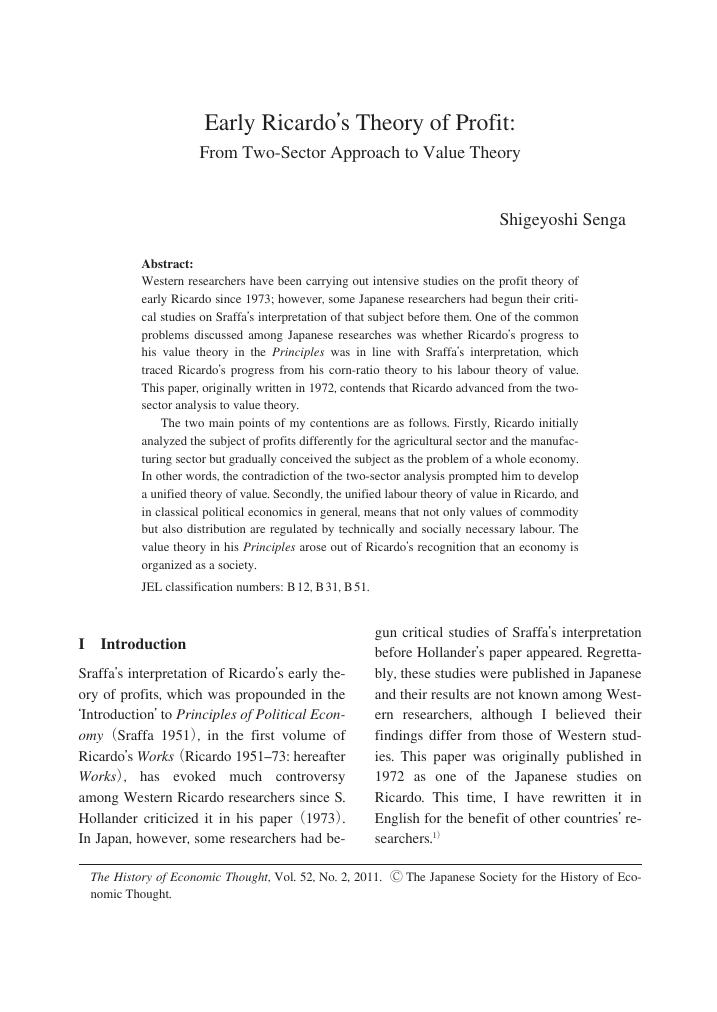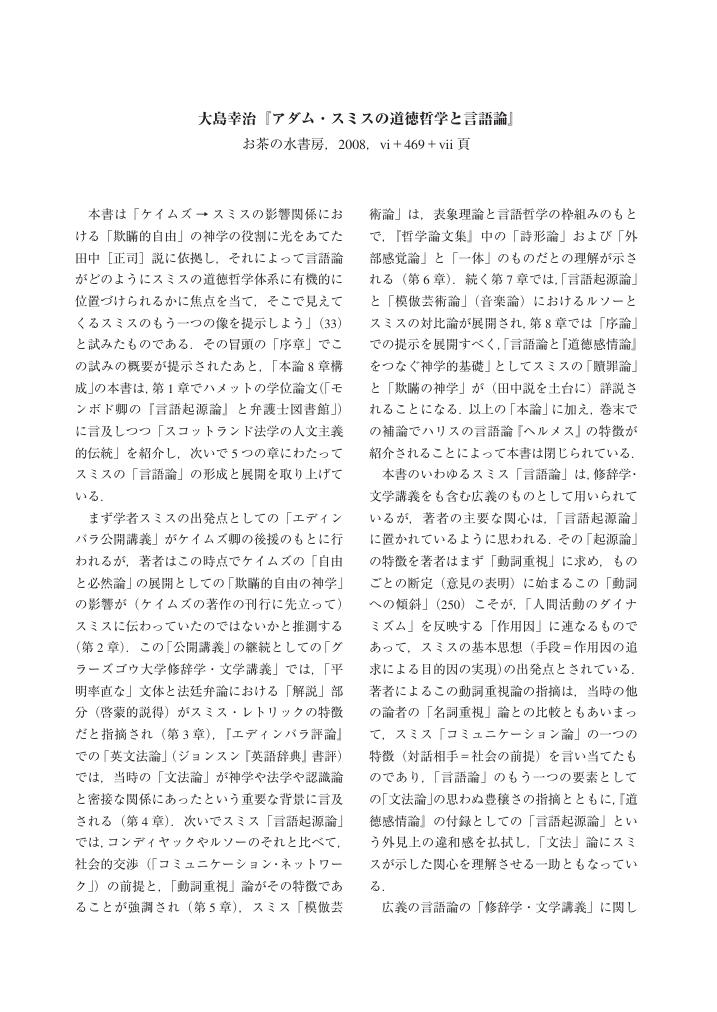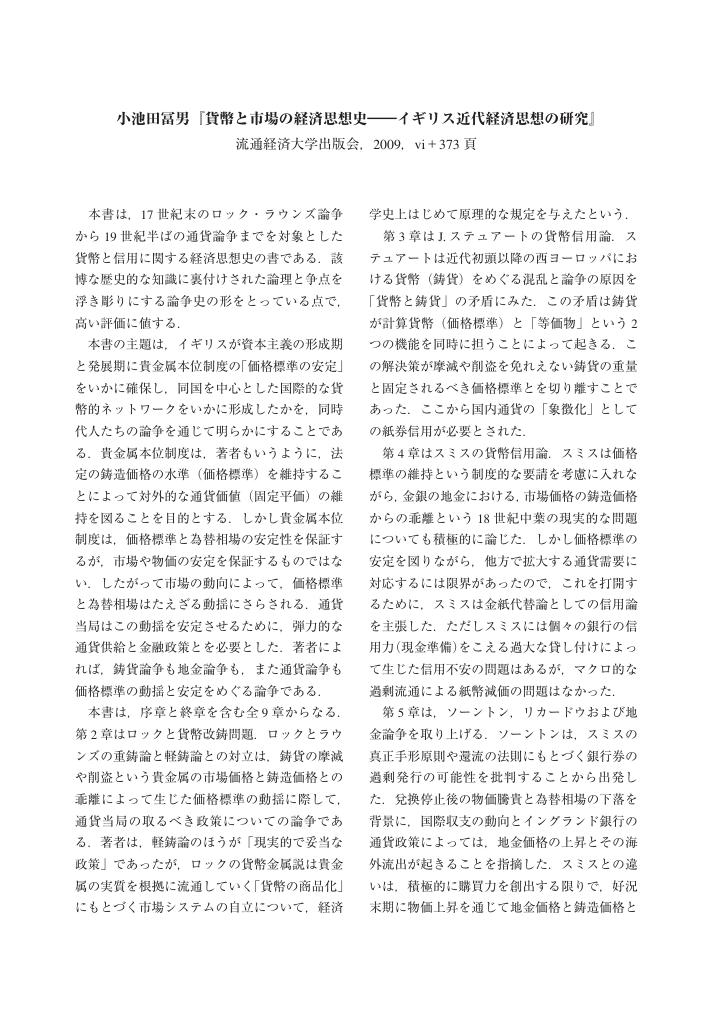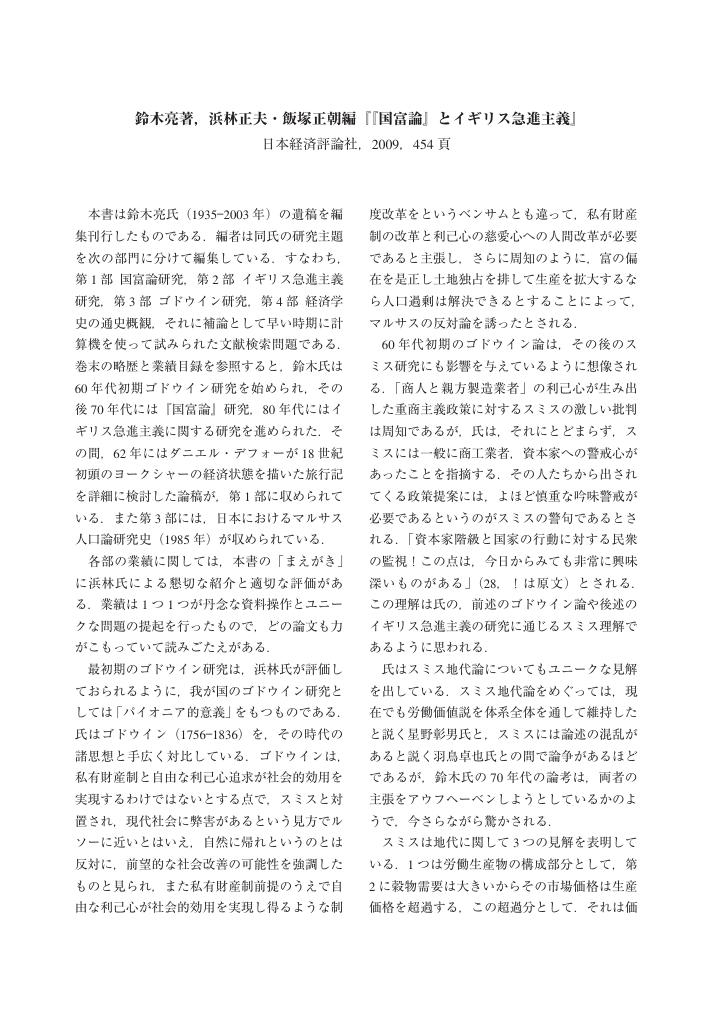1 0 0 0 OA J. S. ミルの理想的市民社会論と株式会社論
- 著者
- 前原 直子
- 出版者
- 経済学史学会
- 雑誌
- 経済学史研究 (ISSN:18803164)
- 巻号頁・発行日
- vol.52, no.2, pp.100-126, 2011 (Released:2019-08-20)
This paper aims to analyze John Stuart Mill’s theory of joint-stock companies on the basis of Mill’s theory of an ideal civil society. Mill recognized that the Industrial Revolution sparked social and economic problems. Unskilled labourers lapsed into moral decadence, which lowered productivity and decreased profit rates; thus this would then result in a dismal stationary state without any reform in the distribution of wealth. However, Mill asserted that social reforms would realize the ideal condition of a civil society even in the stationary state. To resolve these problems, Mill’s theory of joint-stock companies is significant from two perspectives. First, from the perspective of productivity, large-scale production is greatly promoted by the accumulation of large capital through the formation of joint-stock companies. Furthermore, co-operation among various people and combination of the labour force would lead to superior productivity. Second, from the perspective of property, Mill insisted on fair and just distribution of wealth and the necessity of managerial reforms. Reforms aimed at solving the unequal distribution of wealth could raise the living standards and the moral and intellectual standards of labourers. The moral qualities of this new kind of labourers, which could increase the rate of productivity, are as important to the overall efficiency of their labour, as their intellectual qualities. On the basis of the law of the inverse relationship between cost of labour and profits, Mill asserted that superior productivity would reduce the total cost of labour and increase the real wages of labourers and profits of capital. It was for this reason that Mill emphasized the importance of human development in terms of both labour and capital and the significance of joint-stock companies wherein labourers acquire skills and develop their abilities and individual specialties. JEL classification numbers: B 31.
1 0 0 0 OA More than an Economic Theory:
- 著者
- 山崎 好裕
- 出版者
- The Japanease Society for the History of Economic Thought
- 雑誌
- 経済学史研究 (ISSN:18803164)
- 巻号頁・発行日
- vol.52, no.2, pp.131-137, 2011 (Released:2019-08-20)
- 著者
- 岡田 元浩
- 出版者
- The Japanease Society for the History of Economic Thought
- 雑誌
- 経済学史研究 (ISSN:18803164)
- 巻号頁・発行日
- vol.52, no.2, pp.138-140, 2011 (Released:2019-10-28)
- 著者
- 山本 英司
- 出版者
- 経済学史学会
- 雑誌
- 経済学史研究 (ISSN:18803164)
- 巻号頁・発行日
- vol.52, no.2, pp.141-142, 2011 (Released:2019-10-28)
- 著者
- 舩木 惠子
- 出版者
- 経済学史学会
- 雑誌
- 経済学史研究 (ISSN:18803164)
- 巻号頁・発行日
- vol.52, no.2, pp.143-144, 2011 (Released:2019-10-28)
- 著者
- 益永 淳
- 出版者
- 経済学史学会
- 雑誌
- 経済学史研究 (ISSN:18803164)
- 巻号頁・発行日
- vol.52, no.2, pp.145-146, 2011 (Released:2019-10-28)
- 著者
- 村松 茂美
- 出版者
- 経済学史学会
- 雑誌
- 経済学史研究 (ISSN:18803164)
- 巻号頁・発行日
- vol.52, no.1, pp.110-111, 2010 (Released:2019-10-25)
1 0 0 0 OA 長幸男『石橋湛山の経済思想』東洋経済新報社, 2009年, xvii+334頁
- 著者
- 井上 琢智
- 出版者
- 経済学史学会
- 雑誌
- 経済学史研究 (ISSN:18803164)
- 巻号頁・発行日
- vol.52, no.1, pp.114-115, 2010 (Released:2019-10-25)
- 著者
- 太子堂 正称
- 出版者
- 経済学史学会
- 雑誌
- 経済学史研究 (ISSN:18803164)
- 巻号頁・発行日
- vol.52, no.1, pp.116-117, 2010 (Released:2019-10-25)
- 著者
- 平井 俊顕
- 出版者
- 経済学史学会
- 雑誌
- 経済学史研究 (ISSN:18803164)
- 巻号頁・発行日
- vol.52, no.1, pp.118-119, 2010 (Released:2019-10-25)
1 0 0 0 OA Bulgarian Economic Thought since 1989:
- 著者
- Nikolay Nenovsky
- 出版者
- The Japanease Society for the History of Economic Thought
- 雑誌
- 経済学史研究 (ISSN:18803164)
- 巻号頁・発行日
- vol.52, no.2, pp.1-26, 2011 (Released:2019-08-20)
- 被引用文献数
- 2 2
Abstract: The profundity and timing of the collapse of the socialist economies took the economists on both sides of the Iron Curtain by surprise. There were no theories that could explain or analyze the nature of such systemic social events and processes. The soviet- style Marxist political economy, neoclassical theory, and Keynesian interpretations were unable to anticipate, explain, or offer solutions to the real problems. This paper, explores the intellectual reactions of the Bulgarian economic community to the collapse of the planned economy and to the practical and theoretical challenges of the post-communist period. The following are the three primary objectives of this study: First is a methodological objective, i.e., for explaining the dissemination of economic knowledge, determining its channels, as well as explaining the basic transmission mechanisms of economic theory in Bulgaria after the disintegration of the socialist bloc. Second is a purely informational objective, i.e., to present the major topics and issues studied during the period 1989-2009 and the findings of the economists working on them. Finally, the third objective and parallel task is to theoretically interpret the development, characteristics, and specificities of the Bulgarian economic thought during that period. The main conclusion of this study is that although a few interesting studies regarding the Bulgarian economic science have been published, they fail to offer independent and original ideas. The Bulgarian economic perspectives closely follow the trends of western economic science, which itself is currently at crossroads and is encountering numerous challenges. JEL classifications numbers: B 20, B 41, P 50. *
1 0 0 0 OA Early Ricardo's Theory of Profit:
- 著者
- 千賀 重義
- 出版者
- The Japanease Society for the History of Economic Thought
- 雑誌
- 経済学史研究 (ISSN:18803164)
- 巻号頁・発行日
- vol.52, no.2, pp.27-45, 2011 (Released:2019-08-20)
1 0 0 0 OA 中村廣治『リカードウ評伝――生涯・学説・活動』(昭和堂,2009年)をめぐって
- 著者
- 千賀 重義 佐藤 有史
- 出版者
- 経済学史学会
- 雑誌
- 経済学史研究 (ISSN:18803164)
- 巻号頁・発行日
- vol.52, no.1, pp.88-94, 2010 (Released:2019-08-20)
- 著者
- Catherine Martin
- 出版者
- The Japanease Society for the History of Economic Thought
- 雑誌
- 経済学史研究 (ISSN:18803164)
- 巻号頁・発行日
- vol.52, no.1, pp.95-97, 2010 (Released:2019-10-25)
- 著者
- 野口 旭
- 出版者
- 経済学史学会
- 雑誌
- 経済学史研究 (ISSN:18803164)
- 巻号頁・発行日
- vol.52, no.1, pp.98-99, 2010 (Released:2019-10-25)
- 著者
- 伊藤 宣広
- 出版者
- 経済学史学会
- 雑誌
- 経済学史研究 (ISSN:18803164)
- 巻号頁・発行日
- vol.52, no.1, pp.100-101, 2010 (Released:2019-10-25)
- 著者
- 篠原 久
- 出版者
- 経済学史学会
- 雑誌
- 経済学史研究 (ISSN:18803164)
- 巻号頁・発行日
- vol.52, no.1, pp.102-103, 2010 (Released:2019-10-25)
- 著者
- 大友 敏明
- 出版者
- 経済学史学会
- 雑誌
- 経済学史研究 (ISSN:18803164)
- 巻号頁・発行日
- vol.52, no.1, pp.104-105, 2010 (Released:2019-10-25)
- 著者
- 南森 茂太
- 出版者
- 経済学史学会
- 雑誌
- 経済学史研究 (ISSN:18803164)
- 巻号頁・発行日
- vol.52, no.1, pp.106-107, 2010 (Released:2019-10-25)
- 著者
- 和田 重司
- 出版者
- 経済学史学会
- 雑誌
- 経済学史研究 (ISSN:18803164)
- 巻号頁・発行日
- vol.52, no.1, pp.108-109, 2010 (Released:2019-10-25)


